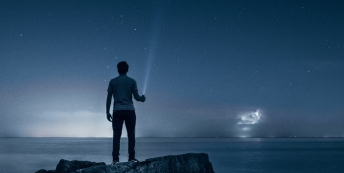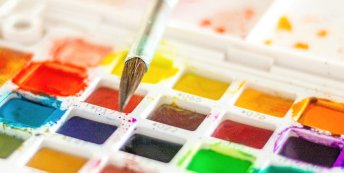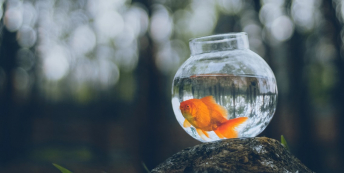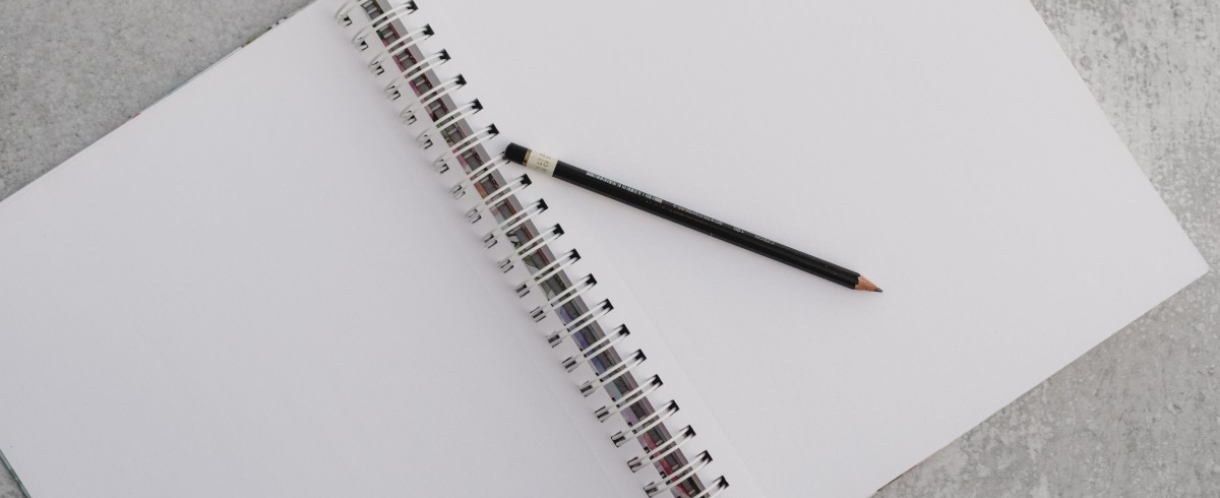
Newly Updated
Image by Ashley West Edwards
When you try to imagine your future career, what can you see? Is there a clear, inspiring image in front of you, or an intimidating blank page? Natasha explains why it's so hard to come up with ideas for your career change, and shares some unconventional lessons from the experts in how to create something from nothing.
I'm not sure about the term 'career change'.
It doesn't quite live up to the enormity of what you're doing.
Yes, you start out in one career and wind up in another, and in many situations in life you'd call that a 'change'. You might change your shoes, or change your route to work, but these things feel like tweaks, alterations – taking what's already there and editing it.
But my guess is, your situation feels much bigger and deeper and stickier than that.
My shift felt more like a private internal coup.
I found myself sparring with weighty, painful, existential questions; fearing for my relationships with my family and my partner; trying to compare personal fulfilment with a full-figured bank balance; encountering insomnia for the first time in my life…
And, on top of that, I knew that whatever my next career was, it wasn't going to be anything like the last one.
So, this wasn't a question of just 'needing a change'. This felt like a whole new beginning.
Does that sound familiar to you?
Starting from nothing is hard.
Here you are, looking at the future of your career, and there's nothing solid in it. There's either more of what you're doing now, or there's a big, looming, blank canvas. It's overwhelming. You don't know where to begin, and the pressure to get it right is paralysing.
The good thing about blank canvases, of course, is that we know it's possible to fill them.
The greatest works of art all started from nothing: a blank page, a formless lump of clay, an empty space.
What we're really doing, as 'career changers', isn't changing. We're creating. We're making up what the rest of our working lives might look like.
And it occurred to me that if we're creating our lives, there might be some valuable lessons to be learned from the other creators in the world: from artists. If we're creating rather than changing, what can we learn from creative types about how to create?
I spent a couple of days in conversation with a group of creatives – writers, woodworkers, textile artists, painters, sculptors and designers – and I asked them: How do you get from a blank canvas to a work of art?
If you're struggling for ideas on what you could do next in your career, or how to get from where you are now to where you want to be, perhaps it's time to shift your thinking from 'change' to 'create'.
Here's how:
1. Get lost

"I don't think that one should sit and look at a blank page. The way around it is to walk around with scrap paper and to take notes, and simply to take notes on the observable world around you. If you walk into this room and see these great columns and think this was once a savings bank, you could put those two things together, and make some notes here – that would be the start of something.
"I think everything – everything – starts with the observable world, and even though you may cut that out of your final go, nonetheless I think this is where it always starts." – Radio host Garrison Keillor.
There's a certain insidious monotony about everyday life.
You get up, go through your morning routine, you go to work, you come home. You see the same things every day; speak to the same people; watch the same shows. And, inside that rhythm and that routine, you might find that your brain switches off.
You stop noticing the details of the world you're living in. You stop being surprised by new discoveries – about yourself, about your life, about the world around you.
And so, when you come to a period of major creation, like a career change, you feel devoid of inspiration. You have no idea what you'd love to do next in your career. You're not entirely sure what it is you love to do now.
What Garrison Keillor is pointing to is the idea that inspiration comes from observation – from approaching the world again from a child's wonder-filled perspective.
What is there to notice about the world you're in? What insights can you glean about who you are, what inspires you, what you love to do, and what kind of impact you want to make on the world, simply by looking, with curiosity and detachment, at your life?
The other beautiful lesson to take from Keillor's insight is that with career change, snapping out of overthinking, list-making mania is always a good idea.
You can observe your own current, familiar world all day long, and eventually you'll have seen all there is to see. You may even feel this way now, having gone ten rounds of self-examination and navel-gazing in your internal search for a new career.
Once you've seen everything, noticed everything, and you still haven't found what you're looking for, then what?
Then it's time to get out of the building. Not just the physical, bricks-and-mortar structure that you're in, but the structure of familiarity and routine that's been constructed around you over the past five, ten, fifteen years.
But how do you do that, in practical terms? Doesn't that perspective shift require a major life event?
This is one of the big questions we explore at the start of our Career Change Launch Pad – and in the past, Launch Pad participants have answered it in a number of simple and profoundly productive ways.
- Sarah took a sewing class – and returned radiant with excitement, having experienced being 'in flow' for the first time in years
- Mark went to a meetup for entrepreneurs – and connected with an inventor who offered to mentor him
- Nancy took a walk through a neighbourhood she'd never been to before – and discovered an animal shelter looking for volunteers, which she felt deeply compelled to get involved with.
It's probably not going to be a comfortable feeling, to begin with. It's not easy to put yourself in new, unfamiliar surroundings. It's so simple to pass it off with a wave of the hand, to sink back into the soft cushions of the couch at the end of a long day at work, rather than to spend your 'free' time doing something challenging, or something that requires you to meet new people, or do something you've never done.
It's even harder to conceive of the idea that simply getting out of your comfort zone will be enough to yield meaningful results. Surely there has to be some purpose, some direction, some logic to whatever you choose to do? According to creatives, perhaps not.
The author Rebecca Solnit equates this feeling of stepping out into the unknown with the feeling of getting lost – and celebrates it as one of the most powerful forms of access to the new, the inspiring, and the unseen:
"To be lost is to be fully present, and to be fully present is to be capable of being in uncertainty and mystery. And one does not get lost but loses oneself, with the implication that it is a conscious choice, a chosen surrender, a psychic state achievable through geography. That thing the nature of which is totally unknown to you is usually what you need to find, and finding it is a matter of getting lost." – Rebecca Solnit
How could you get out of the building – get lost – in search of new inspiration for your career change?
2. Do a little dance

"It's easy for me to get lost in consumption sometimes. I'll get into months where all I do is go to galleries, read books, browse other artists' work online, and listen to art podcasts. I get hungry for inspiration. But then when I get into the studio, I'm still stumped.
The key for me is to create while I'm consuming. If I see a painting that inspires me, I'll make sure I capture a sketch, or even just a colour palette, and make something from it when I get home." – Annika, mixed-media artist.
I was fascinated by Annika's creative process.
Far from entering her studio one day and working solidly until a piece was finished, she would 'magpie' her artwork. She'd paint the background of a canvas in the morning and then head out to a gallery in the afternoon to seek inspiration for the first thing she'd paint on the background.
When I looked back at my own career change, this was absolutely not the creative process I entered into. And perhaps it's why it took me so long to make progress.
Rather than creating my future alongside my search for inspiration, I'd spend days, weeks, months even, ferreting around online for career-change articles, get-rich-quick schemes, stories of people who were living and working in location-independent ways… and never taking a single action of my own to create something new.
This endless consumption of information is what I call a 'passive action': you feel like you're being productive and doing something positive for your career change, but without any forward motion.
The key is to balance every moment of inspiration with a moment of action. Create a process whereby one cannot arise without the other – where they dance together.
This takes practice. It's not always obvious how to turn inspiration into an immediate action.
And when you have a long-term endgame in sight (knowing for sure what your ideal career is and shifting into it), taking small actions that may or may not contribute to achieving your goal can feel arbitrary and pointless.
But it's not pointless. It's pure creative exploration, and, most importantly, it has you doing something.
"I don't know much about 'The Creative Process', like it's a tangible thing, but I do know that making is the only way something gets made. And if I'm just staring at what other people have made, or listening to what they have to say about making things, I'm not an artist; I'm just a voyeur, or a rubbernecker posing as an artist." – Andrew, woodcarver
As a career changer, you're actively involved in digging out inspiration, whether that's looking for companies that excite you, searching for activities that light you up or causes that matter to you. But you need to be engaging with them, actively, rather than simply admiring from a distance.
This is, as Annika and Andrew have expressed, the only way to see real, tangible progress and results in your journey toward work you love.
Rachel took part in our Launch Pad, and admitted on one of our calls that she was a "serial coaching-blog-stalker". She'd spend hours reading the blogs of coaches and lifestyle-design experts, imagining her own face on the homepage and daydreaming about running her own coaching business and lifestyle blog. In the space of one week, she sent an email to a couple of her favourite bloggers and started her own, very basic, blog. A month later, she'd landed her first client.
What could you do to bring action into a dance with your moments of inspiration?
Found a job online that looks amazing, but that you're not qualified for? Send the company an email and ask to have a chat about the work they do. Share with them the fact that you don't think that you're qualified for the role, but you've been inspired by seeing the opportunity. Ask for their advice and insights on moving into the industry.
Maybe you watched a documentary yesterday evening about rock climbing that left you wide-eyed and smiling. Find your local climbing centre and give it a try. Professional mountaineering might not be your ultimate future career, but reaching out and physically interacting with something that inspires you will usually lead you further down the road to clarity about what you want to do.
Is there a cause or an issue that deeply matters to you? A charity you donate to each month, or a topic that leaves you touched and moved when you hear about it on the news? Find an organisation working in that area and see if you can volunteer with them somehow. Reach out. Engage. Act.
3. Build a village
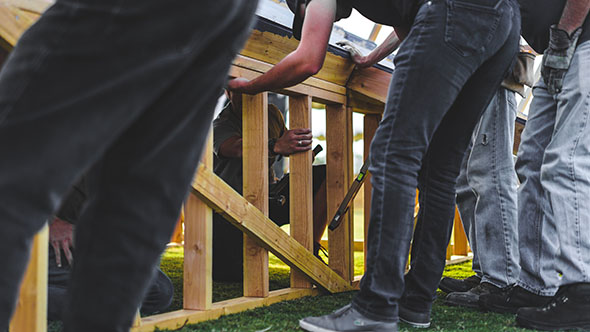
"They say it takes a village to raise a child – I tell you, it takes an army to have me ever create a damn thing.
"I've got people on speed dial for creative emergencies – like when it's 3 a.m. and I've dropped an entire pot of glue over everything I've ever made.
"And then I have people that I meet up with every Sunday to hang out and drink coffee and work, because there are some weeks that I just cannot physically make myself sit in front of the machine on my own, and having that space scheduled each week means I'll always get at least something done.
"And then there's Gina, who knows everything there is to know about fabric and leather and design and creation, and who is my idol and my second mother and my butt-whipper, and who I absolutely could not do any of this without." – Poppy, upholsterer and textile artist.
The image of the artist or creator as a solitary soul, working tirelessly away in an attic somewhere until the masterpiece has been brought forth, is, it seems, a myth.
Virtually all of the people I interviewed for this article mentioned at least one other person who contributed to their ability to create – whether a mentor, another artist, or a friend who acted as a sounding board for ideas.
As a career changer, it's likely you've been driving yourself crazy with your own internal monologues (or lack thereof).
You sit and stare at the blank canvas of your future, and nothing comes to mind. No ideas, no possibilities to explore, no options… All you can hear is the high-pitched, mosquito-esque whine of 'The Void' that is your imagination.
Or perhaps ideas do arise in your head (cue trumpets) and then are immediately shot down:
"That's ridiculous." / "Nobody really makes any money doing that." / "You'd have to go back to school for years." / "Who do you think you are?" / "You don't even know where to start."
Or maybe an idea sticks… and that's all it does. You have no idea what to do with it now that you have it, so you hang onto it miserably, and nothing changes.
Whichever situation you're in, trying to handle it alone is an uphill battle.
Poppy clearly knows this, and so she's surrounded herself with a crack team of people who can help her create – and, importantly, maintain a stream of productivity.
"Some days I'm just totally stumped for what to do next. I feel like all my ideas are stale, and I've made everything I'm capable of making, and it's all over. I get totally miserable. So I call Gina, and we'll bounce a few ideas around, and she'll tell me about this embossing technique she saw at an event the other day, and then I'll see a sparrow out of the window while I'm on the phone, and I'll tell her about the sparrow, and suddenly I'm making a sparrow-embossed leather purse that I never dreamed I'd be making before I got on the phone." – Poppy
The best creators – artists, entrepreneurs, writers, inventors, musicians, etc. – know that alternative perspectives, creative playmates and sounding boards are priceless.
If you're finding it hard to maintain momentum with your career change, having someone to hold you accountable and support you in making regular progress can transform everything. (We see this constantly on our Launch Pad, where weekly calls, a ready-made community of career changers and a space for public commitments to action launch people into never-seen-before productivity and progress.)
And when you're stuck with how to move forward with an idea, connecting with someone who knows more about the subject than you do can not only leave you better informed, it can create new opportunities for you, too.
Last year, I worked with a coaching client, Zoe. When she reached out to a well-known dog trainer to ask for advice on moving into the industry, she was amazed to receive a reply inviting her to attend a two-day event in her area the following month, free of charge. She met a whole community of other dog enthusiasts, and found offers of support, work experience, and even one-off paid jobs showing up for weeks afterwards.
It's also worth noting that it's much better to have a community around you before you need one, rather than scrabbling around for support when you're already floundering. And a community built over time, which you've invested time, energy and value into, is always going to be stronger and more reliable.
Writer and entrepreneur Ben Casnocha makes sure to invest in his 'interesting-people fund':
"The interesting people fund is a pre-commitment strategy: by pre-committing time and money to meeting interesting people, you increase the likelihood that you actually do it. Because many people know they ought to do it, and think about doing it, but when push comes to shove and it's time to take an hour out of your day or spend $40 / £30 buying someone lunch – they punt on it.
"In terms of the long view of networks, if you're not taking the long view, you're doing it wrong. Relationships – be they romantic, platonic, or professional – take time to develop. A lot of time. Rushing a relationship into a short-term transaction can jeopardise the long-term relationship potential."
The best ideas arise from collaboration. Accountability arises from collaboration. Growth and learning arises from collaboration.
Who do you have in your collaborative circle? Who can you put there?
Face forward

When you're feeling trapped in work that makes you miserable, it's easy to bring it with you, one way or another, into the future you're creating.
Either you make a knee-jerk, escape-driven move based entirely on a reaction to the past (I call these Reactive Shifts), or, like a piece of gum stuck to your shoe, you let your assumptions and experiences of the past dictate and limit the parameters of your creation.
Ideas, inspiration, and creativity can absolutely come from the past. Perhaps you're an incredible project manager, and you know this is likely to play a role in your future career. There's nothing wrong with that at all. The trouble is that you can't create something fresh, new and exciting if you let that perspective limit what you're capable of imagining and creating.
The shift in mindset from 'change' to 'create' is about giving yourself space to think beyond what you can already see; to invent and build a future outside of your current world. That's where innovation resides, where new ideas come from, and where ingenious, effective solutions to obstacles can be found.
And I wonder: what might show up if you were to shake off the shackles of what's come before? To free yourself of what limits you and keeps you small, and, like an artist, simply make it up, exactly the way you want it to be?
How could you apply these lessons to your own career change? Let me know in the comments below!


